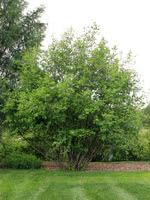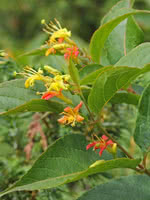Mon-Fri 9am - 5pm Mountain time
Green Alder vs Northern Bush Honeysuckle
Alnus alnobetula subsp. crispa
Diervilla lonicera
SOLD OUT
NOT AVAILABLE THIS SEASON - MIGHT RETURN
Green Alder is a native, cold-hardy shrub found in boreal forests, along slopes, and in open upland habitats. It fixes nitrogen in the soil, improving fertility and helping other plants grow, while its roots help stabilize slopes and disturbed ground. Fast to establish on poor soils, it is widely used in reclamation, restoration, and erosion control projects.
With its smooth grey bark and shiny green leaves, Green Alder often forms dense thickets that provide cover for birds and small mammals. Its seeds, buds, and catkins also supply food for wildlife. Green Alder is well suited for naturalization and ecological restoration.
Note: We use Green Alder for Alnus alnobetula subsp. crispa. This species is also known by many other common names, including Mountain Alder, Sitka Alder, and others. Please confirm the scientific name to ensure you are ordering the correct plant.
The Northern Bush Honeysuckle is a small, dense, deciduous shrub. The trumpet-like yellow flowers bloom late spring to early summer. Dark green leaves turn yellow then red in the fall. The flower nectar has a sweet honey taste that can be sucked out of the flower.
Because of its aggressive suckering habit, the Northern Bush Honeysuckle makes a great hedge, shrub border, or thicket in a woodland garden.
Green Alder Quick Facts
Northern Bush Honeysuckle Quick Facts
In row spacing: 0.9 m (3 ft)

